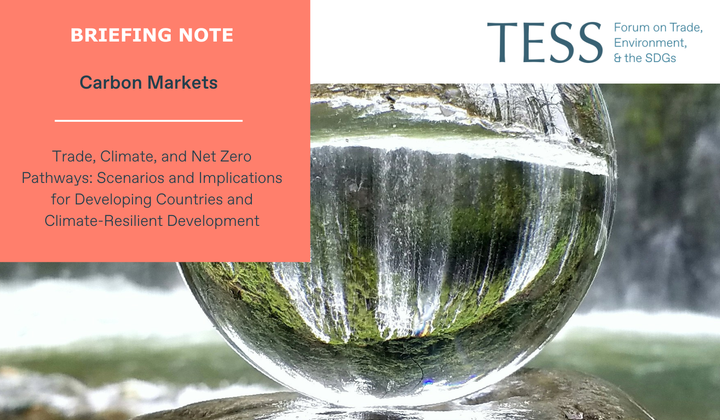International cooperation on trade-climate measures could go a long way towards alleviating trade tensions, reducing fragmentation, and facilitating fair and equitable transitions to a net-zero future.
This article is part of a Synergies series on climate and trade curated by TESS titled Addressing the Climate Crisis and Supporting Climate-Resilient Development: Where Can the Trading System Contribute? Any views and opinions expressed are those of the author(s) and do not necessarily reflect those of TESS or any of its partner organizations or funders.
-----

Faced with the urgent need to address the climate crisis, many governments are implementing or considering a set of trade-related measures with climate objectives. These measures range from standards and regulations to subsidies, public procurement policies, and labelling schemes as well as internal taxes or border carbon adjustments.
Although they have impacts on trade, the design and implementation of such measures primarily occur at the domestic level, with limited attention paid to their potential effects on third countries. As a result, differences in approaches and methodologies reflecting distinct contexts, priorities, and policy goals are increasingly creating a patchwork of uncoordinated national, bilateral, and regional efforts in addition to supply chain or sector-specific initiatives as well as public-private partnerships.
There is growing concern that the lack of cohesion or transparency and the fragmented nature of these trade-climate measures may generate not only competitiveness tensions among trading partners but also add compliance costs for businesses, create unnecessary barriers to trade, and place the burden of adjustment on developing countries. There are also concerns that methodologies and approaches adopted in developing countries are not recognized as equivalent in more advanced economies.
At the World Trade Organization (WTO), a broad range of members has expressed readiness to enhance cooperation around such measures; with intensified discussions prompted by proposals circulated since 2023, including by the African, Caribbean and Pacific Group of States (ACP), African Group, Australia, Chile, China, Colombia, Japan, New Zealand, Republic of Korea, United Kingdom, and United States. Building on these proposals, there are nascent discussions among WTO members on the potential for an outcome on this topic ahead of the 14th WTO Ministerial Conference (MC14) in March 2026—possibly in the form of a soft law instrument fostering enhanced transparency or encouraging members to follow guidance in the design and implementation of measures.
Different Rationales for Cooperation…
Analysis of the proposals highlights the different rationales (or objectives) that are being pursued through cooperation, which can broadly be organized around the concepts of enhancing (i) coherence, (ii) transparency, (iii) interoperability or equivalences, and (iv) development or equity.
Coherence often refers to the assumption that trade-climate measures are legal hybrids and should thus draw in a coherent manner from different regimes of international law—including those relating to the environment, climate change, and international trade, along with general principles of public international law and commitments to sustainable development. Transparency generally relates to the availability of information about new measures, including through WTO notifications, but also during the design process and throughout the implementation phase. Interoperability usually refers to the ability of different systems, such as climate-related standards and policies, to work together effectively and efficiently, for example through the use of common carbon accounting methodologies or by aligning reporting requirements. It can also refer to the opportunity to recognize as equivalent measures that fulfil adequately the same objective even if their design differs. Finally, concepts of equity and development are invoked primarily by developing countries due to concerns about the trade and development impacts of trade-climate measures, including the adjustment costs associated with compliance.
… With Different Levels of Cooperation
Regardless of the goal pursued, discussions on international cooperation have mostly focused on four aspects: (i) principles of international law relevant to trade-climate measures; (ii) processes and practices for the development and implementation of measures (often referred to as “good regulatory practices”); (iii) design features of specific measures; and (iv) technical aspects.
Levels of Cooperation on Trade-Climate Measures

Source: TESS (2025).
At the broadest level, achieving international cooperation could be advanced by establishing high-level guidance on general principles for the formulation of trade-climate measures. An example of this approach is the “voluntary, non-binding and non-exhaustive list of guiding principles for consideration in the design and implementation of measures related to trade and sustainable development” agreed at the G20 Trade and Investment Ministerial Meeting in October 2024.
A number of governments have also expressed interest in establishing high-level voluntary guidance for the regulatory processes and practices related to the development and implementation of trade-climate measures. This approach aims to develop shared understandings of “good regulatory practices” to be followed in the design and implementation of trade-climate measures—for example the list of common practices compiled by the co-convenors of Trade and Environment Sustainability Structured Discussions (TESSD) at the WTO.
At a more detailed level, options for cooperation can be promoted through the identification of particular policy design features. These are typically associated with specific policy instruments such as border carbon adjustments or carbon standards and climate-related labels. They may include approaches to define product or geographical coverage, the use of default values, procedures for accepting equivalences or crediting for third country policies, as well as aspects such as exemptions or transition periods.
Finally, at a more technical level, cooperation can focus on aligning methodologies and processes while allowing countries to pursue distinct policy goals and designs. This usually relates to aspects such as emissions equivalency, sectoral definitions, carbon pricing metrics, or methodologies for measuring or accounting for embedded carbon emissions as well as for reporting and verification.
The following table provides illustrative examples of issues that could be the object of international cooperation under each of these levels.
Examples of Issues Raised Internationally as Requiring Cooperation and Guidance

Towards an Outcome
Discussions in the WTO, particularly under the Committee on Trade and Environment, are currently focusing on a specific cross-cutting dimension of trade-climate measures, namely the establishment on non-binding guidance on methodologies for measuring embedded carbon emissions (see for example WT/CTE/W/269/Rev.3). These discussions cover a range of issues pertaining to good regulatory practices, design features, and technical aspects. They have gathered growing interest, potentially leading to an outcome document ahead of MC14.
Such an outcome at the multilateral level could constitute a significant first step and go a long way towards alleviating trade tensions, reducing fragmentation, and facilitating fair and equitable transitions to a net-zero future.
* This article is partly derived a briefing note published by TESS on Fostering enhanced international cooperation on trade-related measures with climate objectives at the WTO: Coherence, transparency, development, and interoperability.
----------
Christophe Bellmann is Head of Policy and Analysis, TESS.
Carolyn Deere Birkbeck is Founder and Executive Director, TESS.
Yasmin Ismail is Senior Policy Advisor, TESS.
Brian Kelly Nyaga is an independent policy analyst specializing in international trade and carbon markets.
-----
Synergies by TESS is a blog dedicated to promoting inclusive policy dialogue at the intersection of trade, environment, and sustainable development, drawing on perspectives from a range of experts from around the globe. The editor is Fabrice Lehmann.
Disclaimer
Any views and opinions expressed on Synergies are those of the author(s) and do not necessarily reflect those of TESS or any of its partner organizations or funders.
License
All of the content on Synergies is licensed under a Creative Commons Attribution-NonCommercial-ShareAlike 4.0 International (CC BY-NC-SA 4.0) license. This means you are welcome to adapt, copy, and share it on your platforms with attribution to the source and author(s), but not for commercial purposes. You must also share it under the same CC BY-NC-SA 4.0 license.
If you would like to reuse any material published here or if you have any other question related to Synergies, send an email to fabrice.lehmann@graduateinstitute.ch.







